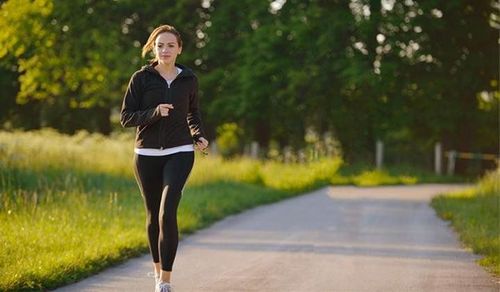This is an automatically translated article.
Narcolepsy is a chronic sleep disorder that interferes with a person's quality of life. To minimize daytime sleepiness, patients can try changing their diet, routine, and surroundings. Here are some tips and tricks suggested by sleep experts to help people better manage narcolepsy.
1. Arrange to schedule a week ahead of schedule
Proactively arranging your schedule in advance will make your work less affected by narcolepsy. For example:
If you find yourself tending to be more sleepy during certain times of the day (like mid-afternoon), schedule important activities to other time frames; If work forces you to be focused or productive at a time when you're prone to falling asleep, find a suitable time to nap 15 to 20 minutes beforehand; Similarly, if you've had a busy day with lots of late-night schedules, let the next morning relax with plenty of free time. Avoid scheduling important events or tasks at this time. If possible, talk to your teacher, supervisor, or manager for a schedule that best suits your situation. Research has shown that people with narcolepsy can easily get tired and exhausted, so resting or shortening the working time will be better for you. For example, instead of choosing a 10-hour shift, you might consider a 6- or 8-hour shift, depending on the severity of your illness.
Watch now: Narcolepsy Treatment
2. Establish and maintain healthy sleep habits
To reduce the frequency of daytime narcolepsy, optimize nighttime sleep quality. Establishing healthy sleep habits is important. Here are some suggestions for you to improve your sleep every night:
Maintain an optimal room temperature, conducive to sleep. According to the National Sleep Foundation (NSF), the ideal temperature is around 18 degrees Celsius; Make sure the bedroom is dark enough to prevent light from affecting your sleep; Turn off electronic devices at least 30 minutes before going to bed. Cell phones, TVs and computers can affect resting brain activity. In addition, the blue light from electronic screens can suppress natural melatonin production, making it even harder to fall asleep. Avoid eating too close to bedtime. According to the NSF, you may have a harder time sleeping if your stomach is still digesting. Avoid eating late at night, avoid eating spicy food or foods high in fat and grease; Avoid drinking alcohol, tea, coffee near bedtime; Try to go to bed at the same time every night. If you wake up in the middle of the night, avoid reaching for your phone or other electronic device. Electronic devices will make it harder for you to go back to sleep.

Hội chứng ngủ rũ là một tình trạng rối loạn giấc ngủ mãn tính
3. Drive safely when you have narcolepsy
In fact, people with narcolepsy are discouraged from driving, at least until their condition improves. To avoid putting yourself and others in danger, it's best to take a few extra steps to drive safely, for example:
Tell your loved ones about your travel schedule and destination. friend; Take a nap 15-20 minutes before hitting the road to feel more alert; Bring medication for narcolepsy; Do not overeat or drink alcohol before driving; If driving long distances, drive only during the day and stay overnight at a motel or hotel; If you must drive at night, go with someone else and ask them to drive at night; Take a short nap while your driving partner is at the wheel; Be ready to pull over to take a break whenever needed. Watch now: Narcolepsy is due to a neurological disorder?
4. Control sudden loss of muscle tone
Some people with narcolepsy may also experience short-term muscle weakness or paralysis, called cataplexy. When you have both, doctors call it type 1 narcolepsy.
An episode of cataplexy usually comes on quickly, lasting a few seconds with symptoms such as bending of the knees, drooping of the eyelids, speaking. installation....However, if the condition is severe, it can cause the patient to fall to the floor.
Cataplexy is often triggered by strong emotions, like laughter or surprise. Once you know the triggers for atony, it's a good idea to inform your family and friends about them to limit their frequency.

Tập luyện thể dục thường xuyên
5. Exercise regularly
Neurologists and stroke experts say that people with narcolepsy should exercise at least 20 minutes before going to bed from 4 to 5 hours. Exercise is an effective way to help you sleep well at night, because the more active you are during the day, the better your body knows when to wake up and when to rest.
Find a form of exercise that you love and stick with for at least 20 minutes a day. Some suggestions that you can refer to are: tai chi, yoga, swimming, tennis, weight training, dancing, gardening... Regardless of the form of practice, you should end the exercise. at least 3 hours before going to bed so that your body can relax and rest comfortably.
6. Track your diet and when to eat
If you have narcolepsy with cataplexy, your body may be lacking the hormone Hypocretin that helps increase alertness. The good news is that there are many foods that contain Hypocretin, such as sourdough bread, dark green leafy vegetables, kimchi, salmon, and other foods rich in Omega-3 fatty acids.
In addition, a lot of people often feel sleepy after eating a big meal, especially people with narcolepsy. The advice is to split portions, eat smaller meals and snack with nuts and berries, prioritizing a low-carb, high-protein diet that will help you stay awake.
Alternatively, you can try keeping a diary of the foods you eat and when you eat them to see how they might affect daytime sleepiness. This can help you determine which foods may help you stay awake and which may worsen your narcolepsy.
Above are some tips and tricks to help you manage narcolepsy on a daily basis. Although narcolepsy is a chronic and lifelong condition, with lifestyle changes, you can minimize your condition and enjoy a healthy, meaningful life. .
Follow Vinmec International General Hospital website to get more health, nutrition and beauty information to protect the health of yourself and your loved ones in your family.
Please dial HOTLINE for more information or register for an appointment HERE. Download MyVinmec app to make appointments faster and to manage your bookings easily.
References: webmd.com, everydayhealth.com













